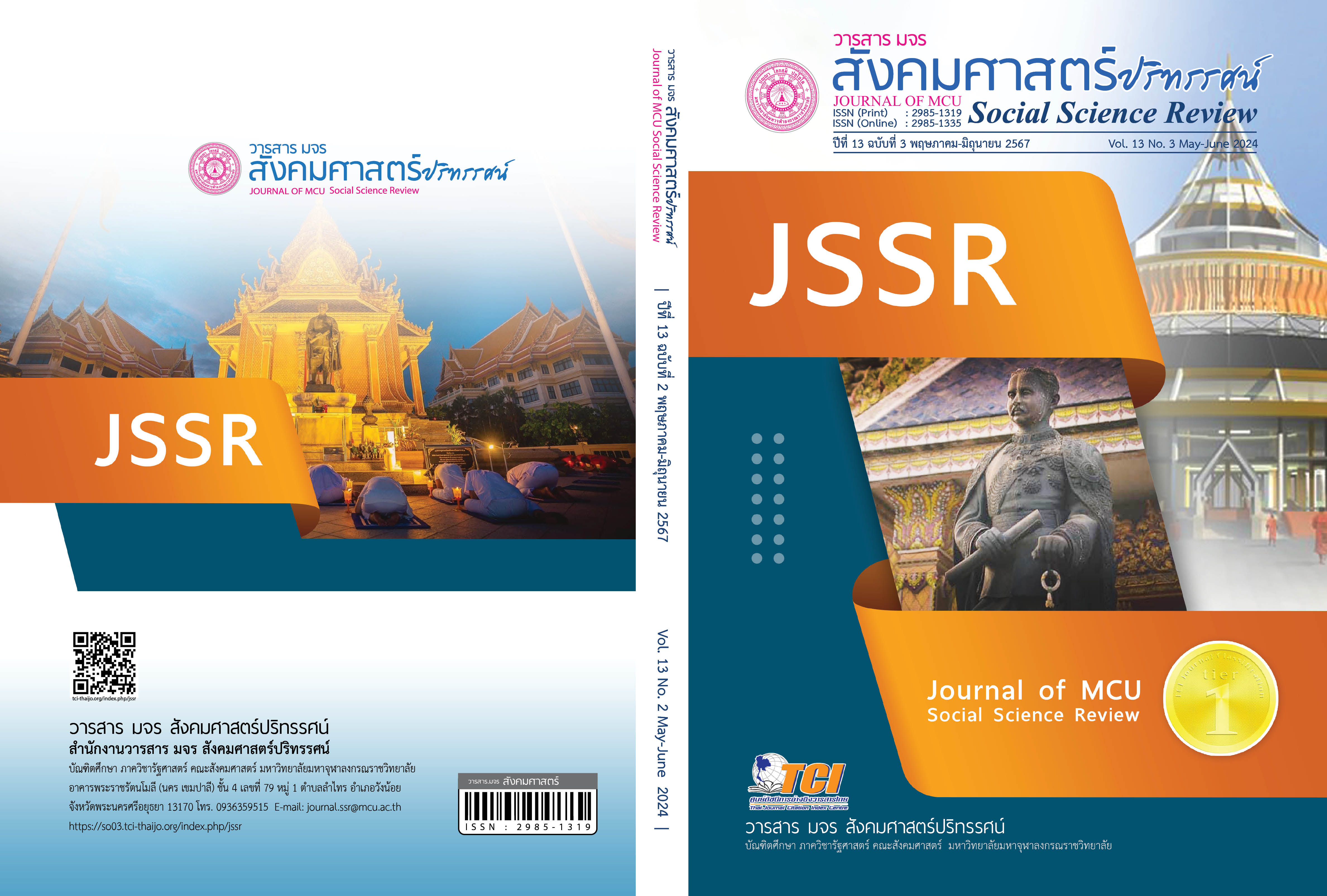การให้ข้อมูลย้อนกลับเพื่อสร้างชุดความคิดเติบโตในระดับการศึกษาปฐมวัย
คำสำคัญ:
การให้ข้อมูลย้อนกลับ, ชุดความคิดเติบโต, การศึกษาปฐมวัยบทคัดย่อ
การศึกษาปฐมวัย เป็นการพัฒนามนุษย์ในช่วงแรกของชีวิตอย่างเป็นองค์รวม เป็นการพัฒนาบนพื้นฐานการอบรมเลี้ยงดูและการส่งเสริมกระบวนการเรียนรู้ที่สนองต่อธรรมชาติ และพัฒนาการตามวัยของเด็กแต่ละคนให้เต็มตามศักยภาพ ภายใต้บริบทสังคมและวัฒนธรรมที่เด็กอาศัยอยู่ ด้วยความรัก ความเอื้ออาทรและความเข้าใจของทุกคน เพื่อสร้างรากฐานคุณภาพชีวิตให้เด็กพัฒนาไปสู่ความเป็นมนุษย์ที่สมบูรณ์ การให้ข้อมูลย้อนกลับเพื่อสร้างชุดความคิดเติบโตในระดับการศึกษาปฐมวัย เป็นส่วนหนึ่งของการส่งเสริมกระบวนการเรียนรู้ที่สนองต่อธรรมชาติและพัฒนาการตามวัยของเด็ก และเป็นสิ่งที่น่าสนใจสำหรับผู้ดูแลเด็กหรือผู้จัดประสบการณ์การเรียนรู้ให้แก่เด็ก โดยเชื่อมโยงให้สอดคล้องกับการจัดการเรียนรู้กับจุดประสงค์การเรียนรู้เพื่อช่วยทำให้เด็กมีชุดความคิดเติบโตที่ดีขึ้น ด้วยหลักการให้ข้อมูลย้อนกลับทั้งทัศนคติ การกระทำ และคำพูด ที่สามารถสร้างชุดความคิดเติบโต หรือการสร้างแนวความคิดให้เด็กตระหนักว่าสติปัญญาหรือความสามารถของตนเองนั้น พัฒนา เติบโต และเปลี่ยนแปลงไปในทางที่ดีได้ โดยอาศัยความพยายามและการเรียนรู้ ซึ่งเป็นคุณลักษณะที่เอื้อต่อการเติบโตขึ้นเป็นผู้ใหญ่ที่สมบูรณ์ในอนาคต
เอกสารอ้างอิง
รัชนี นกเทศ. (2565). การพัฒนากระบวนการนิเทศการสอนตามแนวคิดการให้ข้อมูลย้อนกลับเพื่อเสริมสร้างชุดความคิดเติบโตด้านการจัดการเรียนการสอนของนักศึกษาครู (ดุษฎีนิพนธ์ครุศาสตรดุษฎีบัณฑิต สาขาวิชาหลักสูตรและการสอน). กรุงเทพฯ: จุฬาลงกรณ์มหาวิทยาลัย.
ราชบัณฑิตยสภา. (2555). ศัพท์ศึกษาศาสตร์. กรุงเทพฯ: อรุณการพิมพ์.
สำนักงานคณะกรรมการการศึกษาขั้นพื้นฐาน กระทรวงศึกษาธิการ. (2560). การประเมินเพื่อเรียนรู้: การตั้งคำถามและการให้ข้อมูลย้อนกลับ เพื่อส่งเสริมการเรียนรู้. กรุงเทพฯ: โรงพิมพ์ชุมนุมสหกรณ์การเกษตรแห่งประเทศไทย.
_____. (2561). คู่มือหลักสูตรการศึกษาปฐมวัย พุทธศักราช 2560 สำหรับเด็กอายุ 3-6 ปี. กรุงเทพฯ: โรงพิมพ์ชุมนุมสหกรณ์การเกษตรแห่งประเทศไทย.
Dweck, C. S. (2006). Mindset: The new psychology of success. New York: Random House.
_____. (2008). Mindsets and math/science achievement. CA: Stanford University.
_____. (2020). Self-Theories: Their role in motivation, personality, and development. New York: Psychology Press.
Hattie, J. & Timperley, H. (2007). The power of feedback. Review of Educational Research, 77(1), 81-112.
Pollock, J. E. (2012). Feedback: The Hinge that Joins Teaching and Learning. London: Corwin.
Ricci, M. C. (2013). Mindsets in the classroom: building a culture of success and student achievement in schools. USA: Prufrock Press Inc.
Sullivan, H. & Higgins, N. (1983). Teaching for Competence. New York: Teacher Collage Colombia University.
Truax, M. (2018). The Impact of Teacher Language and Growth Mindset Feedback on Writing Motivation. Literacy Research & Instruction, 57(2), 135-157.
ดาวน์โหลด
เผยแพร่แล้ว
รูปแบบการอ้างอิง
ฉบับ
ประเภทบทความ
สัญญาอนุญาต
ลิขสิทธิ์ (c) 2024 วารสาร มจร สังคมศาสตร์ปริทรรศน์

อนุญาตภายใต้เงื่อนไข Creative Commons Attribution-NonCommercial-NoDerivatives 4.0 International License.
เพื่อให้เป็นไปตามกฎหมายลิขสิทธิ์ ผู้นิพนธ์ทุกท่านต้องลงลายมือชื่อในแบบฟอร์มใบมอบลิขสิทธิ์บทความให้แก่วารสารฯ พร้อมกับบทความต้นฉบับที่ได้แก้ไขครั้งสุดท้าย นอกจากนี้ ผู้นิพนธ์ทุกท่านต้องยืนยันว่าบทความต้นฉบับที่ส่งมาตีพิมพ์นั้น ได้ส่งมาตีพิมพ์เฉพาะในวารสาร มจร สังคมศาสตร์ปริทรรศน์ เพียงแห่งเดียวเท่านั้น หากมีการใช้ภาพหรือตารางหรือเนื้อหาอื่นๆ ของผู้นิพนธ์อื่นที่ปรากฏในสิ่งตีพิมพ์อื่นมาแล้ว ผู้นิพนธ์ต้องขออนุญาตเจ้าของลิขสิทธิ์ก่อน พร้อมทั้งแสดงหนังสือที่ได้รับการยินยอมต่อบรรณาธิการ ก่อนที่บทความจะได้รับการตีพิมพ์ หากไม่เป็นไปตามข้อกำหนดเบื้องต้น ทางวารสารจะถอดบทความของท่านออกโดยไม่มีข้อยกเว้นใดๆ ทั้งสิ้น





